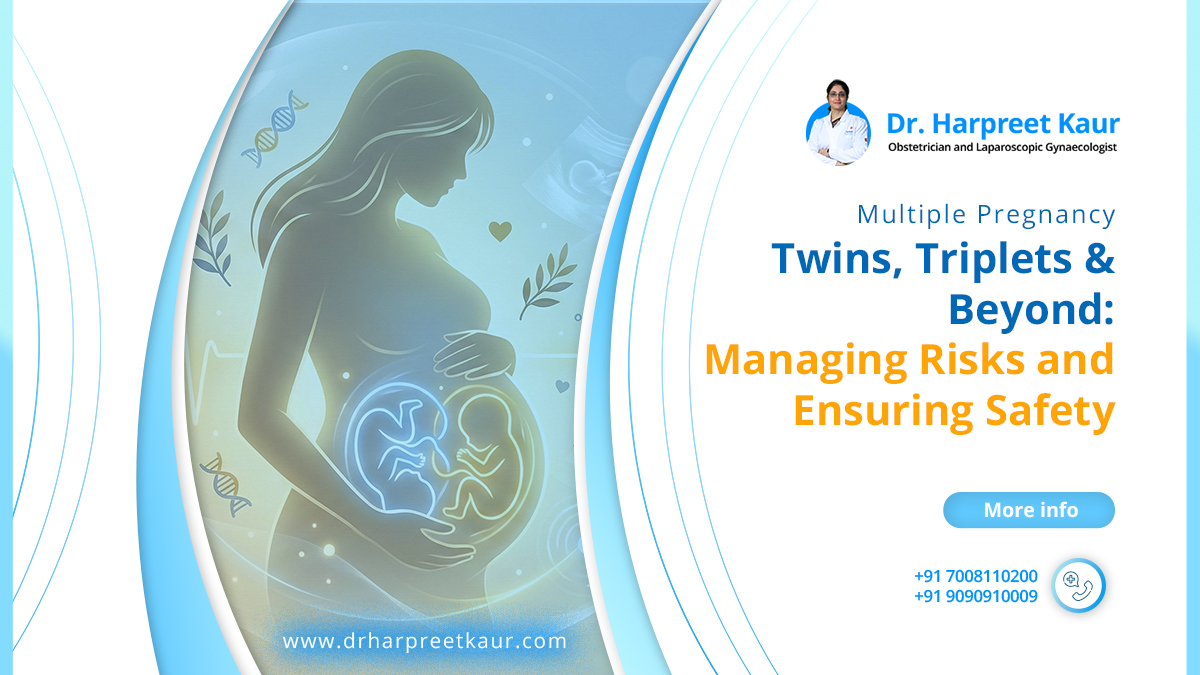Clinic Location
Care n Cure Clinic, Nayapalli, Near Hotel Crown, Bhubaneswar
For Consultation
+91 7008110200
+91 9090910009
Work Hours
Mon - Fri : 05:30 - 07:30
- Home
- About Doctor
- Services
Postnatal care
Gynaecological services
- General Consultatnt
- Adolescent Clinic
- Well Women Clicnic
- Gynaecological Surgeries
- Gallery
- Your Pregnancy
- Training
- Contact
- Feedback
- Blog
- Home
- About Doctor
- Services
Postnatal care
Gynaecological services
- General Consultatnt
- Adolescent Clinic
- Well Women Clicnic
- Gynaecological Surgeries
- Gallery
- Your Pregnancy
- Training
- Contact
- Feedback
- Blog
- Home
- About Doctor
- Services
Postnatal care
Gynaecological services
- General Consultatnt
- Adolescent Clinic
- Well Women Clicnic
- Gynaecological Surgeries
- Gallery
- Your Pregnancy
- Training
- Contact
- Feedback
- Blog
Multiple Pregnancy (Twins, Triplets & Beyond): Managing Risks and Ensuring Safety

A multiple pregnancy — whether twins, triplets, or more — is a journey filled with joy, anticipation, and unique challenges. While it brings double (or triple) the happiness, it also requires specialized multiple pregnancy management to ensure safety for both the mother and the babies. With expert guidance from experienced specialists like Dr. Harpreet Kaur, mothers can navigate this high-risk journey with confidence and care.
Understanding Multiple Pregnancy
A multiple pregnancy occurs when a woman carries more than one baby at a time. The most common forms are twin pregnancies, but some women conceive triplets or higher-order multiples. Multiples can be identical, formed from one fertilized egg that splits, or fraternal, resulting from two or more separate eggs fertilized during the same cycle.
This condition is becoming increasingly common with the rise in assisted reproductive technologies (ART) such as IVF, which can result in multiple embryos being implanted.
How Multiple Pregnancies Occur
Several factors can contribute to a multiple pregnancy:
- Genetics: A family history of twins or multiples can increase chances.
- Maternal Age: Women over 30, especially those undergoing fertility treatments, are more likely to conceive multiples.
- Fertility Treatments: Ovulation-inducing medications and IVF play a significant role.
While multiple pregnancies can occur naturally, modern fertility practices have made them more frequent — emphasizing the need for careful multiple pregnancy management.
Why Multiple Pregnancy Management Is Crucial
Carrying more than one baby means the mother’s body works harder. There’s an increased risk of preterm birth, gestational diabetes, preeclampsia, and anemia. Babies, too, face risks such as low birth weight or developmental challenges if born early.
This is where specialized antenatal care for multiples becomes vital. Close medical supervision, nutritional balance, and timely interventions can significantly reduce risks.
Common Complications in Multiple Pregnancy
- Preterm Birth: Most twins and triplets are born before 37 weeks.
- Low Birth Weight: Each baby receives less space and nutrients.
- Gestational Diabetes & Hypertension: Common due to increased hormonal demands.
- Twin-to-Twin Transfusion Syndrome (TTTS): Occurs in identical twins sharing a placenta.
Effective high-risk pregnancy management can help detect these conditions early, allowing timely treatment and ensuring better outcomes.
Antenatal Care for Multiples: The Foundation of Safety
For expectant mothers of twins or triplets, antenatal care for multiples becomes more frequent and detailed. Key elements include:
- Frequent Ultrasounds: To monitor growth, amniotic fluid, and placental function.
- Nutritional Counseling: Increased calorie, protein, and iron intake is crucial.
- Rest & Monitoring: Adequate rest and avoiding overexertion help reduce preterm risk.
Every mother’s journey is unique, and an individualized care plan by Dr. Harpreet Kaur ensures each pregnancy is managed safely and smoothly.
Twin Pregnancy Care: What Makes It Different
Twin pregnancy care requires a fine balance of maternal and fetal monitoring. Doctors track fetal heart rates, measure growth discrepancies, and evaluate the mother’s blood pressure and weight gain. Cervical length scans help predict and prevent preterm labor, ensuring proactive interventions.
Triplet Pregnancy Risks: Going Beyond the Usual
Triplet pregnancies are inherently more complex and often classified as high-risk. The risks of preterm delivery, gestational hypertension, and nutritional deficiency increase significantly. Regular checkups and hospital-based monitoring become essential, ensuring both maternal and neonatal health are protected.
High-Risk Pregnancy Management: The Doctor’s Role
Expert high-risk pregnancy management involves a multidisciplinary approach. Obstetricians, dietitians, fetal medicine experts, and neonatologists work together to ensure comprehensive care.
Under the supervision of Dr. Harpreet Kaur, expectant mothers receive the best combination of medical expertise and emotional support throughout their pregnancy journey.
Safe Delivery in Twin Pregnancy: Choosing the Right Birth Plan
When it comes to safe delivery in twin pregnancy, the birth plan depends on the babies’ positions, the mother’s health, and pregnancy progression. While vaginal delivery may be possible, many multiple pregnancies are delivered via Cesarean section to reduce risks. Having a specialist like Dr. Harpreet Kaur, experienced in managing twin and triplet births, ensures both safety and comfort.
Postnatal Care and Recovery
After delivery, both the mother and babies require attentive postnatal care. Monitoring for anemia, postpartum depression, and lactation challenges is vital. Babies may need neonatal observation, especially if born prematurely.
Conclusion: Managing Multiples with Confidence
A multiple pregnancy brings unmatched joy but also requires extra care, awareness, and medical supervision. With personalized multiple pregnancy management under experts like Dr. Harpreet Kaur, mothers can experience a safe pregnancy and confident delivery — turning a complex journey into a truly rewarding experience.

